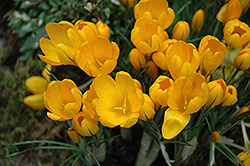Plant Library
Height: 3 inches
Spacing: 3 inches
Sunlight:
![]()
Hardiness Zone: 3a
Description:
Beautiful large, golden yellow cup-shaped flowers contrast against lawn green foliage; vigorous, clump-forming selection that blooms in the early spring; excellent when clustered in beds, borders, rock gardens or containers; adaptable as a houseplant
Ornamental Features
Golden Yellow Crocus has masses of beautiful gold cup-shaped flowers at the ends of the stems in early spring, which are most effective when planted in groupings. Its attractive grassy leaves remain forest green in colour with prominent white stripes throughout the season.
Landscape Attributes
Golden Yellow Crocus is an open herbaceous perennial with an upright spreading habit of growth. It brings an extremely fine and delicate texture to the garden composition and should be used to full effect.
This is a relatively low maintenance plant, and should never be pruned except to remove any dieback, as it tends not to take pruning well. It has no significant negative characteristics.
Golden Yellow Crocus is recommended for the following landscape applications;
- Mass Planting
- Rock/Alpine Gardens
- General Garden Use
- Naturalizing And Woodland Gardens
Planting & Growing
Golden Yellow Crocus will grow to be only 3 inches tall at maturity, with a spread of 4 inches. When grown in masses or used as a bedding plant, individual plants should be spaced approximately 3 inches apart. Its foliage tends to remain low and dense right to the ground. It grows at a slow rate, and under ideal conditions can be expected to live for approximately 5 years. As an herbaceous perennial, this plant will usually die back to the crown each winter, and will regrow from the base each spring. Be careful not to disturb the crown in late winter when it may not be readily seen! As this plant tends to go dormant in summer, it is best interplanted with late-season bloomers to hide the dying foliage.
This plant should only be grown in full sunlight. It does best in average to evenly moist conditions, but will not tolerate standing water. It is not particular as to soil type or pH. It is somewhat tolerant of urban pollution. Consider covering it with a thick layer of mulch in winter to protect it in exposed locations or colder microclimates. This particular variety is an interspecific hybrid. It can be propagated by multiplication of the underground bulbs; however, as a cultivated variety, be aware that it may be subject to certain restrictions or prohibitions on propagation.


